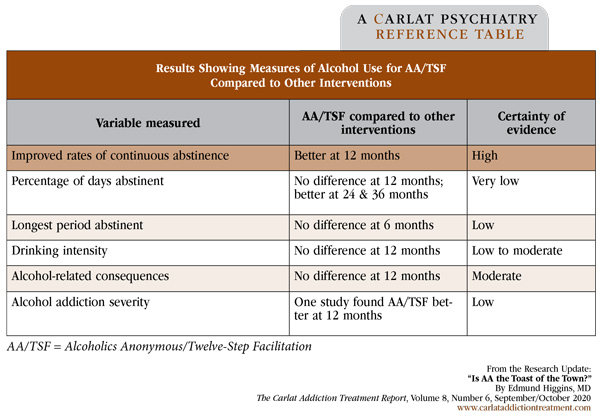Home » Is AA the Toast of the Town?
Is AA the Toast of the Town?
October 21, 2020
From The Carlat Addiction Treatment Report
Edmund Higgins, MD
Dr. Higgins has disclosed that he has no relevant financial or other interests in any commercial companies pertaining to this educational activity.
Review of: Kelly JF et al, Cochrane Database Syst Rev 2020;(3):CD010216
Alcoholics Anonymous (AA) is the most widely used psychosocial treatment for alcohol use disorder (AUD). Historically, low quality of scientific evidence has limited our ability to speak confidently of AA’s effectiveness. Previous Cochrane reviews (which tend to occupy the highest rung on the evidence pyramid) have concluded that superiority cannot be assumed for AA over other therapies, including cognitive behavioral therapy (CBT) or motivational enhancement therapy (MET) (Ferri M et al, Cochrane Database Syst Rev 2006;(3):CD005032).
So, it caused a stir in the substance use treatment community when John Kelly et al reported in an updated 2020 Cochrane review that there is “high quality evidence that manualized AA/Twelve-Step Facilitation (TSF) programs are more effective than other established treatments.”
In Cochrane fashion, the authors scoured the world’s literature for interventional trials (randomized, quasi-experimental, and non-randomized) that compared AA or TSF to something else (CBT or MET, 12-step variants, or no treatment). They also searched for economic studies that assessed health care savings.
The authors identified 27 studies that included a total of 10,565 participants. The table below shows the results for various measures of alcohol use. Manualized AA/TSF produced higher rates of continuous abstinence than the other treatments with good-quality evidence (see highlighted row in table below). Other measures of sobriety were largely no different or of low certainty.
In regard to the economic outcomes, four of the five studies found substantial cost savings from AA/TSF. Kelly, the lead author of the review, told The New York Times that “it’s the closest thing in public health we have to a free lunch” (Frakt A and Carroll AE, March 11, 2020).
What is TSF and how can it be employed in the clinic? TSF is a professionally delivered treatment that facilitates involvement in AA. It is an active, ongoing methodology—not just a one-time referral to AA or a handing out of pamphlets. The National Institute on Alcoholism and Alcohol Abuse has published a guide for clinical and research settings (https://pubs.niaaa.nih.gov/publications/projectmatch/match01.pdf). Successful engagement appears to stimulate AA attendance and involvement, which in turn enhances sobriety.
Non-manualized AA/TSF (meaning the treatment did not occur in a research setting and/or did not follow a structure that could be validated by the studies’ authors) performed as well as other established treatments.
CATR’s Take
Studies that assess the impact of AA are heterogeneous—as is AA, and that’s part of its strength—but this is the first time that high-quality meta-analytic data supports the effectiveness of AA as well as our facilitation of it by actively accompanying patients through the steps. Clinicians should familiarize themselves with TSF strategies they can employ in their clinical settings.
Addiction TreatmentAlcoholics Anonymous (AA) is the most widely used psychosocial treatment for alcohol use disorder (AUD). Historically, low quality of scientific evidence has limited our ability to speak confidently of AA’s effectiveness. Previous Cochrane reviews (which tend to occupy the highest rung on the evidence pyramid) have concluded that superiority cannot be assumed for AA over other therapies, including cognitive behavioral therapy (CBT) or motivational enhancement therapy (MET) (Ferri M et al, Cochrane Database Syst Rev 2006;(3):CD005032).
So, it caused a stir in the substance use treatment community when John Kelly et al reported in an updated 2020 Cochrane review that there is “high quality evidence that manualized AA/Twelve-Step Facilitation (TSF) programs are more effective than other established treatments.”
In Cochrane fashion, the authors scoured the world’s literature for interventional trials (randomized, quasi-experimental, and non-randomized) that compared AA or TSF to something else (CBT or MET, 12-step variants, or no treatment). They also searched for economic studies that assessed health care savings.
The authors identified 27 studies that included a total of 10,565 participants. The table below shows the results for various measures of alcohol use. Manualized AA/TSF produced higher rates of continuous abstinence than the other treatments with good-quality evidence (see highlighted row in table below). Other measures of sobriety were largely no different or of low certainty.
In regard to the economic outcomes, four of the five studies found substantial cost savings from AA/TSF. Kelly, the lead author of the review, told The New York Times that “it’s the closest thing in public health we have to a free lunch” (Frakt A and Carroll AE, March 11, 2020).
What is TSF and how can it be employed in the clinic? TSF is a professionally delivered treatment that facilitates involvement in AA. It is an active, ongoing methodology—not just a one-time referral to AA or a handing out of pamphlets. The National Institute on Alcoholism and Alcohol Abuse has published a guide for clinical and research settings (https://pubs.niaaa.nih.gov/publications/projectmatch/match01.pdf). Successful engagement appears to stimulate AA attendance and involvement, which in turn enhances sobriety.
Non-manualized AA/TSF (meaning the treatment did not occur in a research setting and/or did not follow a structure that could be validated by the studies’ authors) performed as well as other established treatments.
CATR’s Take
Studies that assess the impact of AA are heterogeneous—as is AA, and that’s part of its strength—but this is the first time that high-quality meta-analytic data supports the effectiveness of AA as well as our facilitation of it by actively accompanying patients through the steps. Clinicians should familiarize themselves with TSF strategies they can employ in their clinical settings.
Table: Results Showing Measures of Alcohol Use for AA/TSF Compared to Other Interventions
(Click to view full-size PDF.)
Issue Date: October 21, 2020
Table Of Contents
Recommended
Newsletters
Please see our Terms and Conditions, Privacy Policy, Subscription Agreement, Use of Cookies, and Hardware/Software Requirements to view our website.
© 2026 Carlat Publishing, LLC and Affiliates, All Rights Reserved.



_-The-Breakthrough-Antipsychotic-That-Could-Change-Everything.webp?t=1729528747)



